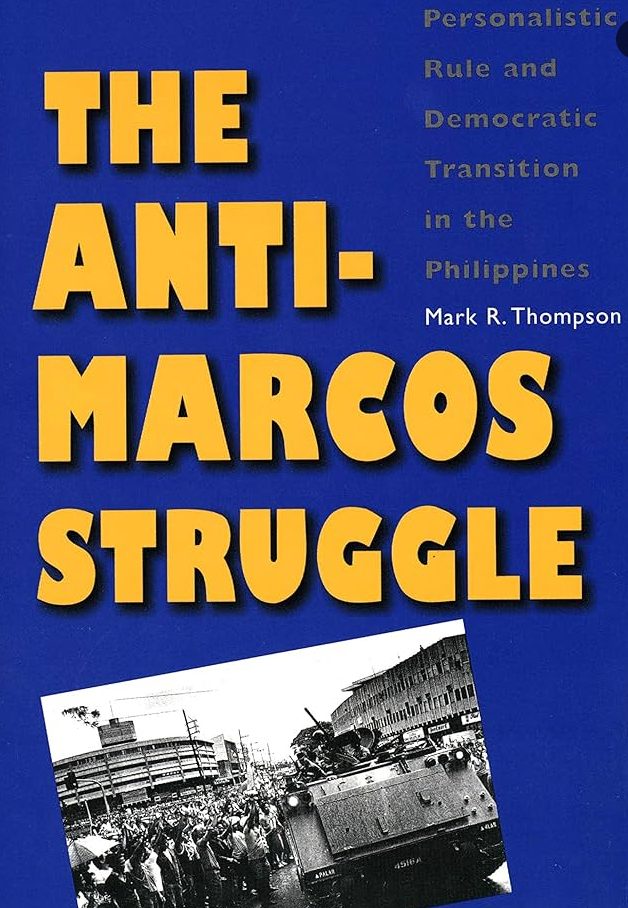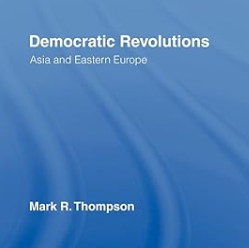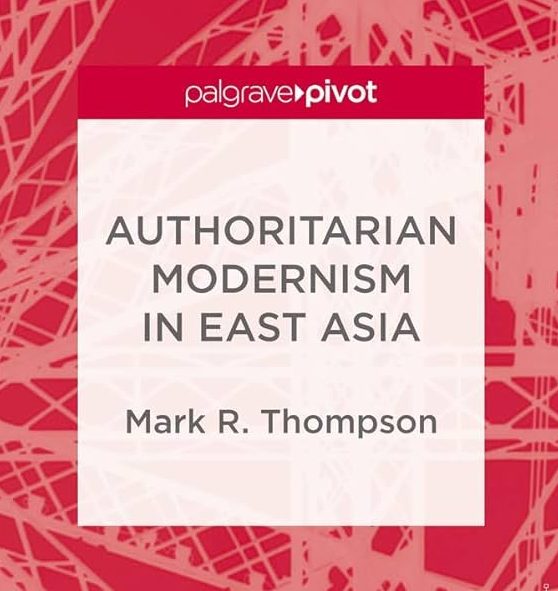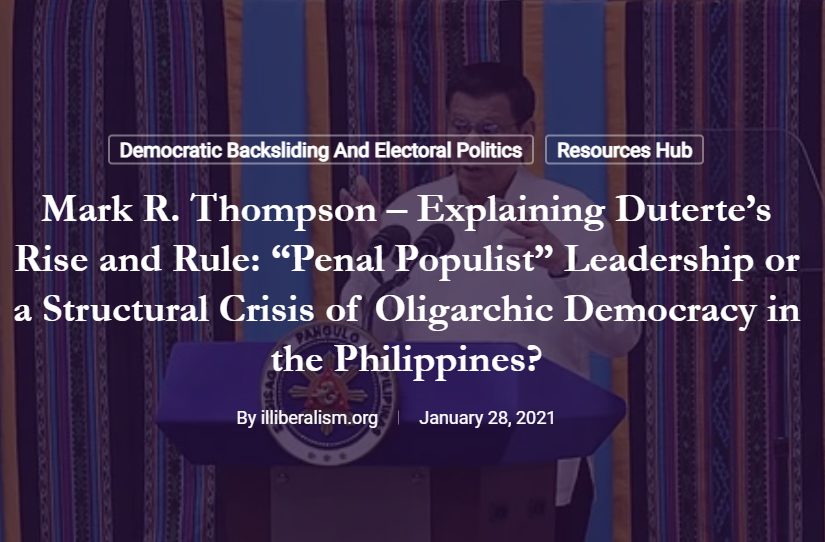Thompson, Mark Richard
VISITOR’S VOICE
Interview with マーク・リチャード・トンプソン »
香港城市大学
東アジア政治
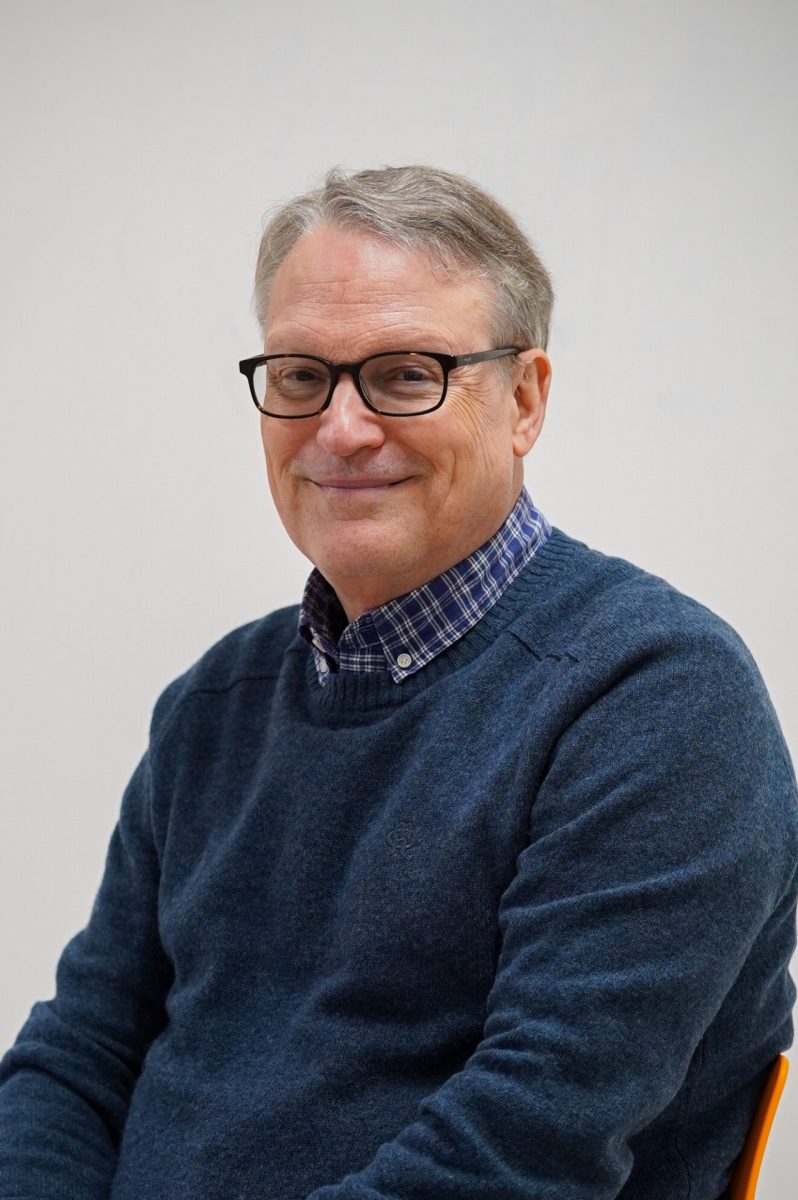
好きなことを教えてください。
研究
この職業における最大の贅沢は、興味のある問いに対する答えを探求するための時間とリソースを得られることです。
教育
学生と対話し、批判的思考を養うよう促しつつ、その科目に興味をもたせることは、とてもやりがいのある仕事です(期待に応えてくれず、少々イライラすることもよくありますが!)。
執筆
少なくとも、流れに乗っているときは(論文や本の原稿を書き始めると、キーボードの前で手が動かなくなることもよくありますが)。時には苦しい作業ではありますが、思考を(少なくとも多少は)明晰にするための唯一の方法だと思います。
Interview
フィリピン史における民主主義の後退、反対派の抵抗、政治サイクル
01
ご研究について教えてください。
ブラウン大学でのルームメートであったフィリピン人から、フィリピンで研究するよう勧められ、私はロータリー財団の奨学金を得て、フィリピン大学(UP)ディリマン校の修士課程に進みました。当時はアキノ氏が暗殺された直後で、ほどなくしてマルコス政権が崩壊する直前でもあり、言うまでもなく、政治的に非常に興味深い時期でした。私はフィリピン大学で政治学のほか、フィリピン語(そしてドイツ語)を学びました。その後、ハワイ大学で中級フィリピン語コースを受講し、フィリピンに戻ってさらに2年間フィールドワークをしました(アテネオ・デ・マニラ大学フィリピン文化研究所に所属)。これが私の博士論文の土台となり、後に、書籍The Anti-Marcos Struggle: Personalist Rule and Democratic Transition in the Philippines(Yale 1995)として出版されました。
その後、ドイツに移り、まったく違うことをするつもりでしたが、その直後にベルリンの壁が崩壊し、私は研究対象を変えて、東ドイツの蜂起についての論文を執筆しました。友人や同僚からは疑問視されましたが、文化的・歴史的・社会経済的違いがどれほどあろうと、東欧の蜂起は「政治的」な出来事としては、フィリピンの「ピープルパワー革命」やアジアのその他の平和的抗議行動に重要な点で似ていると指摘しました。これはのちに、Democratic Revolutions: Asia and Eastern Europe(Routledge 2004)として出版されることになりました。
その後、2008年にシンガポール国立大学にリー・コン・チアン(Lee Kong Chian)特別研究員として滞在したことをきっかけに、シンガポールへの関心が高まりました。それ以前に、シンガポール与党である人民行動党(PAP)が主張する「アジア的価値観(Asian values)」の言説について執筆したことがありましたが、鄧小平の「南巡」以降、習近平が権力を確立するまで、中国本土がいかに都市国家をイデオロギー的・政策的モデルと見ていたのかに注目するようになりました(信じられないかもしれませんが)。こうして一連の共著論文の他に、共編著China’s ‘Singapore Model’ and Authoritarian Learning(Routledge 2020)、さらに、単著Authoritarian Modernism in East Asia(Palgrave 2019)が出版されました。後者では、シンガポール(それ以前は日本)がいかにこの地域の政権モデルとなって、民主化の圧力に抗しながら急速に経済を発展させようとしたかを論じました。
私はジョセフ・エストラーダ政権の時に再びフィリピン政治に関する研究を始めました。エストラーダは自らを「貧困層寄り」のポピュリストと称し、経済的に苦しい立場にある国民の苦境を理解せず「良い統治(good governance)」の方を強調する「リベラル改革派」を排除しました。私はフィリピンの「超大統領制」にも関心をもち、共編著でPresidentialism in Southeast and East Asia (Routledge 2023)を刊行しました。この論文集では、エストラーダ政権の崩壊、後継者と目されていた有名な映画俳優でもあったフェルナンド・ポー・ジュニアが2004年の大統領選で不正によって敗れた経緯、また、2016年の大統領選に立候補した元副大統領ジェジョマル・ビナイが上院の調査によって妨害された経緯について述べました。血なまぐさい「麻薬戦争」を掲げるドゥテルテの暗黒政治が、ポピュリストを求める空白を埋めたのです。
近著The Philippines: From ‘People Power’ to Democratic Backsliding(Cambridge 2023)では、ドゥテルテの台頭と支配を歴史的文脈において論じました。CSEASではこうした考察を発展させ、歴史的解釈が現代フィリピン政治のパラダイムにどう影響してきたかを検証しています。文化を固定的なものと捉えたり、歴史のコースに依存する見方の限界を指摘しつつ、私は、どのように大統領の強権化と対抗するエリート層による「民主主義の聖戦」の繰り返しという政治的パターンが、過去一世紀間にわたり現れてきたかを強調しています。こうした一連のサイクルとして捉えられる現象の一つに、2022年の大統領選挙でフェルディナンド・マルコス・ジュニアが、父親の権威主義的支配を懐古するキャンペーンを展開し圧勝したことが挙げられます。これにより、1986年のEDSA革命(ピープルパワー革命)によってフィリピン人が「奇跡的に」独裁から解放されたという物語は、1972年にマルコス・シニアが戒厳令を発令した後に経済発展の「黄金時代」が到来したという語りによってかき消されてしまったのです。
02
研究で出会った印象的なひと、もの、場所について、エピソードを教えてください。
フィールドワークでは、インタビューが常にとても重要です。ロータリークラブのイベントでは、フェルディナンド・マルコス・シニア氏と短時間ながら会うことができました。また、当時の首相で代表的なテクノクラートであったセサル・ビラタ氏にも、彼がバタサン・パンバナ(Batasang Pambana)での議席獲得を目指して選挙運動を行なっていた際に会うことができました。これらは、UPの学生として忘れられない体験でした(クラスメートの活動家に誘われて抗議行動にも何度か参加した経験も同様です)。その後、コリー・アキノ氏にインタビューする機会を得ましたが、彼女は大統領時代や政治的遺産について話すことを非常に嫌がっていました。その数週間前にインタビューしたポーランドの元大統領レフ・ワレサ氏とは大違いでした。ジョセフ・エストラーダ氏にも長いインタビューを行いました。彼は「市長大統領」を自認し(当時のマニラ市長)、フィリピン政界できわめて華々しい人物の一人という評判どおりのふるまいでした。UPの学生であった私は、ロータリー財団の奨学金受給者としてロータリークラブの会合に参加することを求められたのですが、それは、私が心配していたような退屈なビジネスミーティングとは無縁のものでした。クラブが招いた有力なビジネス反対派が、経済崩壊の中で権威主義的な大統領に嫌気がさした人々に向けて、熱のこもったスピーチを繰り広げることもよくありました。こうした経験を経て、私は博士論文のための研究をマルコス反対派に絞ることにしました。そして最近になってまた、フィリピンに限らず東南アジア各国における専制政治への抵抗に興味を覚え、それらの研究に取り組んでいます。
03
研究の成果を論文や本にまとめる際の難しさをどのように克服していますか?
まさに難問であり、大量の研究成果は場合によってはトラップにもなりかねません。博士論文のためにフィリピンで2年間のフィールドワークを終えて帰国したとき、私は大量の本、新聞の切り抜き、未公開資料、インタビューノートを抱えており、索引カードを作成するのに何カ月もかかりました(デジタル化される前の未開の時代にです!)。資料の山に埋もれ、論文の第1章を書くのに永遠に時間がかかるように思えました。ですから博士課程の院生には、各章の草稿は二次資料に基づいて書くことをおすすめします。その後でフィールドワークを始め、さらに調査が必要なのは何かを見極め、準備段階で自分の思考を整理し、フィールドワークで収集した資料に圧倒されないようにしてください。
04
若い人におすすめの本があれば教えてください。
● Barrington Moore, The Social Origins of Dictatorship and Democracy: Lord and Peasant and the Making of the Modern World, 1965(バリトン・ムーア著、宮崎隆次・森山茂徳・高橋直樹訳『独裁と民主政治の社会的起源―近代世界形成過程における領主と農民(上・下巻)』岩波書店、2019)
古典ですが、(やや厳密すぎるでしょうがたいへん刺激的な)階級分析により、現代政治の主な系譜(自由主義的民主主義、社会革命、保守反動)を説明することに途方もない努力がはらわれており、今でも読む価値が大いにあります。
●James Scott, The Moral Economy of the Peasant: Rebellion and Subsistence in Southeast Asia, 1976(ジェームズ・スコット著、高橋彰訳『モーラル・エコノミー─東南アジアの農民叛乱と生存維持』勁草書房、1999)
これもまた、古典です。東南アジアにおける農民運動について鋭く洞察し、「上からの政治」という典型的な分析とは対照的な重要な著作です。こうした観点は、著者のその後の著作(Weapons of the Weak: Everyday Forms of Peasant Resistance, 1985)などでさらに深められています。
● Garry Rodan, Participation Without Democracy: Containing Conflict in Southeast Asia, 2018
理論志向の政治経済学者による先駆的な著書です。著者はシンガポール、フィリピン、マレーシアでの長年のフィールドワークに基づき、政治参加の拡大が時として論争を促すのではなく、むしろ抑制してしまうというはっきりとしたパラドックスを説明する革新的な概念を提示しています。
● John Sidel, Republicanism, Communism, Islam: Cosmopolitan Origins of Revolution in Southeast Asia, 2021
国家の枠をはるかに超えた綿密な歴史研究と概念の明確化により、インドネシア、フィリピン、ベトナムにおける革命の起源を浮き彫りにした並外れた研究書です。
● Alfred McCoy, Policing America’s Empire: The United States, the Philippines, and the Rise of the Surveillance State, 2009
植民地時代と冷戦期のフィリピンにおける、アメリカの対反乱戦略の系譜を明らかにした大著です。
● Leloy Claudio, Taming People’s Power: The EDSA Revolutions and their Contradictions, 2013
現代フィリピン政治の基底を成したかつての「ピープルパワー」について、諸説ある言説形成過程(公式の「イエロー」ナラティブ、共産党左派の国民民主主義の言説、サバルタンというべき農場労働者の従属的視点)を識別することによって、ピープルパワーの多義的な遺産を見事にとらえています。
● Caroline Hau, Elites and Ilustrados in Philippine Culture, 2017
主に文献資料に基づく鋭い洞察と革新的見解が詰まった本です。フィリピンを研究する社会学者は多くのことを学べるはずです。
05
今後の抱負をお聞かせください。
私の場合、フィールドワークに基づいた事例研究が多いのですが、これまでの研究をまとめて、東南アジアについてより広範な見解を提起することです。
06
なぜCSEASを選ばれたのでしょうか。
自分の研究プロジェクトについてCSEASの研究者(旧知の研究者もいます)と語り合えることに加え、ここに滞在する期間は、CSEASについてさらに学ぶ機会にもなるでしょう。それを私が所属する香港城市大学東南アジア研究センター(SEARC)に生かせればと思っています。また、「アジアにおける東南アジア研究コンソーシアム(SEASIA)」をとおしてSEARCとCSEAS、さらには地域内の他の東南アジア研究機関との連携を強化したいと思っています。
(2024年1月)
マーク・リチャード・トンプソン(Mark Richard Thompson)
香港城市大学公共国際関係学部長(政治学)、東南アジア研究センター長。著書に、The Philippines: From ‘People Power’ to Democratic Backsliding(Cambridge, 2023)、Presidentialism and Democracy in Southeast and East Asia (co-editor, Routledge, 2023)、China’s ‘Singapore Model’ and Authoritarian Learning(co-editor, Routledge, 2020)、Authoritarian Modernism in East Asia(Palgrave, 2019)、Routledge Handbook of the Contemporary Philippines(co-editor, 2018)、Democratic Revolutions: Asia and Eastern Europe(Routledge, 2004)、The Anti-Marcos Struggle: Personalist Rule and Democratic Transition in the Philippines(Yale, 1995)がある。香港政治学会(Hong Kong Political Science Association)とアジア政治国際研究協会(Asian Political and International Studies Association)の会長を歴任。シンガポール国立大学(2008年)とスタンフォード大学(2009年)で東南アジア研究のリー・コン・チアン特別研究員を務めた。ブラウン大学で宗教学の学士号、ケンブリッジ大学で社会政治学の修士号、イエール大学で政治学の博士号(優秀成績)を取得。イエール大学ではホアン・J・リンス氏とジェームズ・C・スコット氏に師事。東南アジア地域研究研究所招へい研究員として2024年1月〜4月に在籍。
Visitor’s Voiceのインタビューをお読みくださり、ありがとうございました。
ぜひ感想をお聞かせください。
